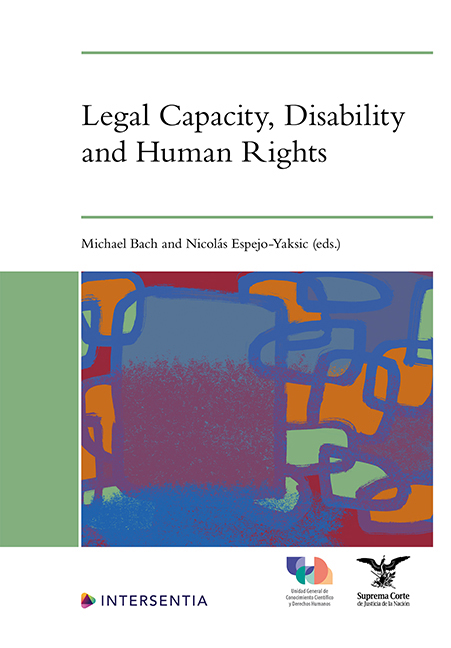Book contents
- Frontmatter
- Foreword
- Acknowledgements
- Contents
- List of Cases
- List of Contributors
- Legal Capacity, Disability and Human Rights: Introduction
- PART I HISTORICAL PERSPECTIVES AND THEORETICAL FRAMES
- PART II LAW REFORM: COUNTRY AND REGIONAL PERSPECTIVES
- PART III LEGAL QUESTIONS, PERSISTENT CHALLENGES
- Index
- About the Editors
Emerging Judicial Precedents Related to Legal Capacity in Latin American High Courts
Published online by Cambridge University Press: 03 April 2024
- Frontmatter
- Foreword
- Acknowledgements
- Contents
- List of Cases
- List of Contributors
- Legal Capacity, Disability and Human Rights: Introduction
- PART I HISTORICAL PERSPECTIVES AND THEORETICAL FRAMES
- PART II LAW REFORM: COUNTRY AND REGIONAL PERSPECTIVES
- PART III LEGAL QUESTIONS, PERSISTENT CHALLENGES
- Index
- About the Editors
Summary
Al andar se hace camino
Y al volver la vista atrás
Se ve la senda que nunca
Se ha de volver a pisar.
Antonio Machado, Caminante no hay caminoINTRODUCTION
This chapter presents an overview of some precedents considered groundbreaking for the evolution of jurisprudence concerning legal capacity in Latin American courts. This text does not attempt to be an exhaustive study of jurisprudence as it pertains to legal capacity in the Latin American region; instead, it provides an initial approach to its current status by identifying the precedents considered to have set the trend in the last decade. To that end, a series of emerging central themes have been identified, making up the content and scope of international law standards on the subject, as they refer to:
– recognition of legal capacity with out discrimination due to disability;
– the guarantee of accessibility, reasonable adjustments, and support for the exercise of legal capacity;
– the right of access to justice and adoption of procedural adjustments;
– self-determination, mental capacity, and informed consent;
– the right to exercise sexual and reproductive rights;
– the right to family life.
LEGAL CAPACITY IN COURT PRECEDENTS: MAKING THE PAThAS WE WALK
The Latin American region has been undergoing a process of law reform to incorporate the standards of the United Nations Convention on the Rights of Persons with Disabilities (hereinafter UNCRPD) regarding legal capacity. The justice system is a fundamental actor in this process. It is possible to identify precedents that have been accompanying the implementation of this change, as well as others that have been driving it forward. However, there is still a long way to go towards deepening a disability perspective and a human rights-based approach to legal capacity.
RECOGNITION OF LEGAL CAPACITY with OUT DISCRIMINATION BASED ON DISABILITY
The recognition of legal capacity on an equal basis with others requires, among other things, that legal capacity be recognised and can be exercised with out discrimination on the basis of disability. On this point, the jurisprudence in the Latin American region is quite dissimilar.
- Type
- Chapter
- Information
- Legal Capacity, Disability and Human Rights , pp. 109 - 130Publisher: IntersentiaPrint publication year: 2023



